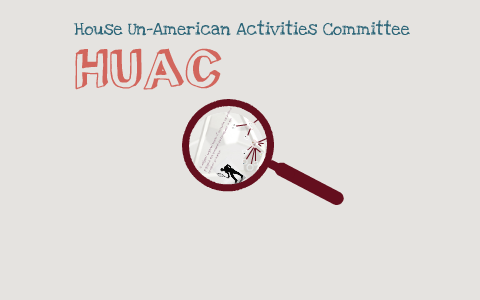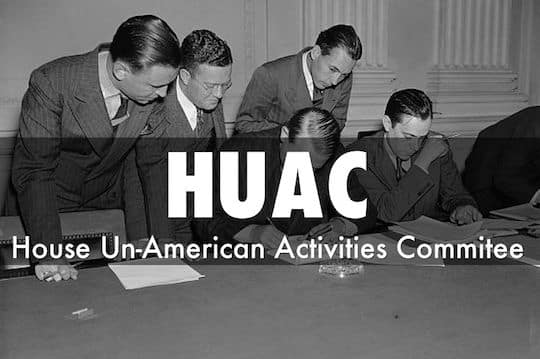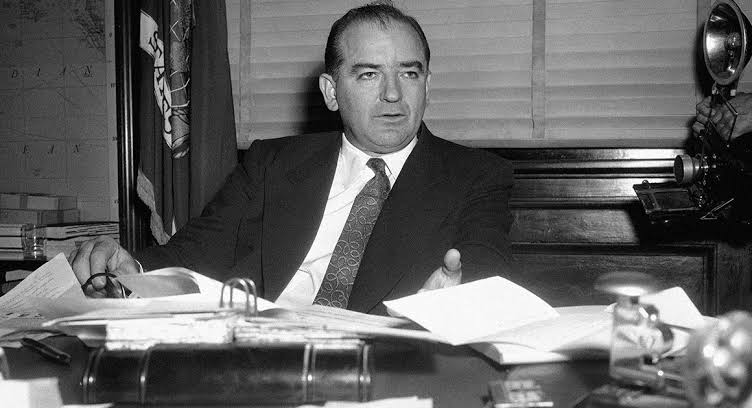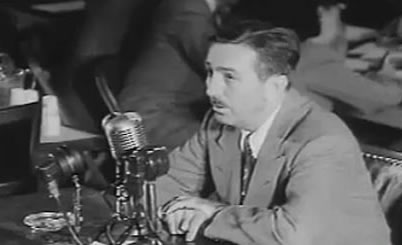

The HUAC (House Un-American Activities Committee) was created in 1938 to investigate alleged disloyalty and rebel activities in the USA by individuals or organizations suspected of having Communist ties. The threat of Communism, labelled as ‘The Red Scare’ drove a wedge between society and the US Government. As investigations increased, the lines between ‘civil liberties’ and ‘national security’ became blurred. In 1947, the committee devoted nine days of hearings into alleged Communist propaganda and influence in the Hollywood movie industry. Anyone refusing to answer questions put by committee members faced conviction on ‘Contempt of Congress’ charges. ‘The Hollywood Ten’ were blacklisted by the industry as a result of this policy.

Senator Joseph McCarthy of Wisconsin
Eventually, more than 300 artists – including directors, radio announcers, actors, and particularly screenwriters – were boycotted by the studios. After Hitler attacked the Soviet Union and Russia became an ally of the West, movies such as Mission to Moscow, The North Star and Song of Russia, were made in support of the Allied war effort. Indeed, the first of these was made at the request of White House officials. After the war ended, however, and in response to HUAC investigations, most studios produced a number of anti-Communist and anti-Soviet Union propaganda films. Universal-International was the only major studio not to purposefully produce such a film.
The HUAC fed off the hysteria of the Cold War, and paved the way for Republican Senator (from Wisconsin) Joseph McCarthy to begin hearings in the Senate in 1953. The impact of these hearings was to ruin the careers of many individuals and to foster political paranoia toward anyone even suspected of holding contrary political views or of joining suspected political organizations. When ‘The Hollywood Ten’ were briefly imprisoned for ‘contempt’, the major studios initially supported them, but that quickly changed and they were blacklisted. The HUAC subpoenaed members of the film industry in the 1950s, asking questions not only about their own activities, but also about fellow workers. About one third of those subpoenaed co-operated with the committee rather than risk jail or blacklisting. Powerful groups such as the American Legion encouraged its 2.8 million members to picket movies made by people who had not co-operated with the HUAC.

Lionel Stander
Under HUAC chairman Martin Dies Jr, a report was released as far back as 1938, naming forty-two ‘Communists’ in the movie industry. These included Humphrey Bogart, James Cagney, Katharine Hepburn, Fredric March and Melvyn Douglas. Dies then said he would ‘clear’ all those on the list who ‘co-operated’ by meeting him in ‘executive sessions’. Within two weeks all but minor actor Lionel Stander of Republic Pictures were ‘cleared. Stander was promptly fired by Republic.

Walt Disney Testifying before the H.U.A.C.
In 1941, Walt Disney placed an ad in Variety, the industry trade magazine, declaring that ‘Communist agitation’ was behind a cartoonists and animators strike at his studio. In fact, the strike had resulted from Disney’s overbearing paternalism, high-handedness, and in-sensitivity. In October 1947, the HUAC issued subpoenas to movie people to testify at hearings. The first to appear were Walt Disney and the then president of the Screen Actors Guild, Ronald Reagan. Disney named a few ‘probable Communists’ at his studio; Reagan did not name names, but his stance severely damaged his marriage to actress Jane Wyman and ultimately led to their divorce. Actor Adolphe Menjou declared: ‘I am a witch hunter if the witches are Communists. I am a Red- baiter. I would like to see them all back in Russia.’

Ronald Reagan testifying
Other leading Hollywood figures, among them director John Huston and actors Humphrey Bogart, Lauren Bacall, Judy Garland and Danny Kaye, organized the ‘Committee for the First Amendment’, to protest the government’s targeting of the film industry. After Sterling Hayden assured Bogart he was not a Communist, a local Washington paper reported that he most certainly was one, Bogie accused him and Danny Kaye, shouting, ‘You fuckers sold me out!’ The group came under attack as being both naïve and foolish. Whilst not denouncing the committee, Bogart, under pressure from Warner Brothers, said his protest trip to Washington was ‘ill-advised, even foolish.’ Director Billy Wilder told the group that, ‘we oughta fold’.

Dalton Trumbo
Fallout from the HUAC hearings saw the primary owner of RKO Pictures, Floyd Odium, leave the industry and Howard Hughes purchase the studio in May 1948. Within weeks he had fired most of the studio’s employees and all but shut the place down for six months as he had the political sympathies of the remainder of his employees investigated. Then he made the decision to settle a long-standing ‘federal anti-trust suit’ against the industry’s ‘Big Five’ studios. This proved to be one of the crucial steps in the collapse of the ‘studio system’ that had governed Hollywood for a quarter-century. One of the ‘Hollywood Ten’, writer Dalton Trumbo, later stated that he felt the ‘Contempt of Congress’ charge was justified. ‘I had contempt for that Congress and have had contempt for several since’, he said. Another member of ‘the Ten’, director Edward Dmytryk, publicly announced he was once a Communist, and was prepared to name others and give evidence. He was released from jail and his career recovered. Producer Adrian Scott, a former friend, was one of those named by him. It was not until 1972 that he again got a screen credit, although not in a feature film.
Larry Parks before the Committee
In 1951, with Congress now under Democratic control, the HUAC launched a second investigation. Actor Larry Parks told the committee on being called: ‘Don’t present me with the choice of either being in contempt of this committee and going to jail or forcing me to really crawl through the mud to be an informer. For what purpose? I don’t think it is a choice at all. I don’t think this is really sportsmanlike. I don’t think this is American. I don’t think this is American justice.’ He ultimately testified, becoming, however reluctantly, ‘a friendly witness’. Parks found himself blacklisted, nonetheless! On March 21, 1951, Parks was asked if he knew actor Lionel Stander. He replied that he knew the man but had no knowledge of his political affiliations. Nothing more was said about Stander, not by Parks nor anyone on the committee, yet the man’s phone stopped ringing. He had worked on ten TV shows in the previous hundred days. Afterwards, nothing.
When Stander himself was called before the HUAC, he told them precisely what he thought of their actions. ‘I know of a group of fanatics who are desperately trying to undermine the Constitution of the United States’, he told them, ‘by depriving artists and others of life, liberty and the pursuit of happiness without due process of law…I can tell names and cite instances and I am one of the first victims of it. [This is] a group of ex-Fascists and America-Firsters and anti-Semites, people who hate everybody, including Negroes, minority groups, and most likely themselves. These people are engaged in a conspiracy outside all the legal processes to undermine the very fundamental American concepts upon which our entire system of democracy exists.’ Perhaps, it was his pledge of full support in the fight against ‘subversive activities’ that fooled the committee into thinking he was about to rail against the Communist Party, that enabled Stander to get through his monologue without being cut off prematurely.

Leave a Reply